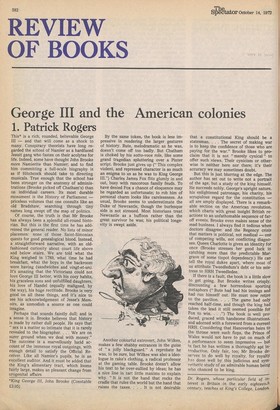kEVIEW OF BOOKS
George III and the American colonies
1. Patrick Rogers This* is a rich, rounded, believable George III — and that will come as a shock to many. Conspiracy theorists have long regarded the school of Namier as a hardfaced Jesuit gang who fasten on their acolytes for life. Indeed, some have thought John Brooke more Namierite than Namier; and to find him committing a full-scale biography is as if Hitchcock should take to directing musicals. True enough that the school has been stronger on the anatomy of administrations (Brooke picked off Chatham's) than on individual careers. Its most durable monument is the History of Parliament — priceless volumes that one consults like an old Bradshaw, searching through tiny names long swept off the map of politics.
Of course, the truth is that Mr Brooke has always been a splendid all-round historian. But this is the first time he has addressed the general reader. No lists of minor placemen: none of those Saint-Simonian quests for good genealogical blood. Instead, a straightforward narrative, with an oldfashioned curiosity about court life above and below stairs. We are told what the King weighed in 1789, what time he had breakfast, what the boys in the backroom were having (sandwiches and vingt-et-un). It's amazing that the Victorians could not love George III better, with his cosy habits, his graceless sons and unfulfilled daughters, his love of Handel (equally maligned, by the way), his huge rectitude. Brooke is very good on all these things, and it's nice to see his acknowledgement of Jesse's Memoirs, as unmodish a source as one could imagine.
Perhaps that sounds faintly dull; and in a sense it is. Brooke believes that history is made by rather dull people. He says that "sex is a matter so intimate that it is rarely revealed to the biographer. . . . We are on surer ground when we deal with money." The outcome is a marvellously lucid account of the immense royal outgoings, with enough detail to satisfy the Official Receiver. Like all Namier's pupils, he is an excellent auditor. And it must be added that the King's alimentary tract, which looms fairly large, makes an pleasant change from urogenital affairs.
*King George III, John Brooke (Constable 0.95) By the same token, the book is less impressive in rendering the larger gestures of history. Bute, melodramatic as he was, doesn't come off too badly. But Chatham is choked by his sotto-voce role, like some grand tragedian spluttering over a Pinter script. Brooke just gives up (" This complex violent, and repressed character is as much an enigma to us as he was to King George III.") Charles James Fox flits glumly in and out, busy with rancorous family feuds. To have denied Fox a chance of eloquence may be regarded as unfortunate; to rob him of personal charm looks like carelessness. As usual, Brooke seems to underestimate the Duke of Newcastle, though the burlesque side is not stressed. Most historians treat Newcastle as a buffoon rather than the great survivor he was; his political longevity is swept aside.
Another colourful extrovert, John Wilkes, makes a few shabby entrances in the guise of "a jolly blackguard." A reprobate he was, to be sure, but Wilkes was also a ideologue in rake's clothing, a radical professor at the gaming table. Brooke doesn't allow his text to be over-sullied by ideas; he has a nice line in tart little maxims to explain why. "It is not the hand that rocks the cradle that rules the world but the hand that raises the taxes. . . . It is not desirable that a constitutional King should be a statesman. . . . The secret of making war is to keep the confidence of those who are paying for the war." Brooke likes to proclaim that it is not "merely cynical" to offer such views. Their cynicism or otherwise is neither here nor there; it's their accuracy we may sometimes doubt.
But this is just blurring at the edge. The author has set out to write not a portrait of the age, but a study of the king himself. He succeeds nobly. George's upright nature, his enlightened patronage, his charity, his scrupulous regard for the constitution — all are amply displayed. There is a remarkable section on the American revolution, which charts with great insight British reactions to an unfathomable sequence of faroff events. Brooke even makes sense of the mad business. I always find it tedious when doctors disagree: and the Regency crisis that matters is political, not medical — one of competing wills, not conflicting diagnoses. Queen Charlotte is given an identity for once (Brooke stresses her good luck in catching more than the predictable Margrave of some tinpot dependency.) He can tell the royal dukes apart, where most of us attribute Tweedledum's debt or his mistress to HRH Tweedledee.
If there is a fault, the book is a little slow to get going. But Brooke writes crisply, discounting a few horrendous sporting metaphors (" Bute had had his innings and had run himself out. He must now retire to the pavilion. . . . The game had only reached half-time, and though the king had taken the lead it still seemed possible for Fox to win. . . .") The book is well produced, graced with handsome illustrations, and adorned with a foreword from a current HRH. Considering that Hanoverian heirs to the throne were such flops, the Prince of Wales would not have to put on much of a performance to seem impressive — but in fact he has written a thoroughly apt introduction. Only fair, too; Mr Brooke dese-ves to do well by royalty, for royalty ha, done well by this judicious and syrnrPthetic study of an admirable human being who chanced to be king.
Dr. Rogers, whose particular field of interest is Britain in the early eighteenji icentury, teaches at King's College, London.














































 Previous page
Previous page